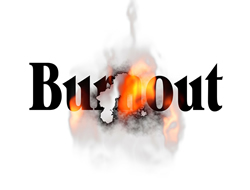Rob & Terri Bogue* explain that the cause of burnout is not always overwork as some of our best times are also our busiest.

Image by Gerd Altmann
Burnout is classically seen in three factors: exhaustion, cynicism, and lack of personal effectiveness.
Of these three components, which are candidates to cause burnout? In other words, which came first: the proverbial chicken or the egg?
Teasing out causality is notoriously hard in research circles.
Indicating correlation—that two things tend to occur together—is statistically straightforward.
Causation requires the introduction of time as an isolating variable, and, given the constraints of research grants, that can be challenging.
However, much like the proofs that we all hated in our geometry class, we can evaluate each of the criteria to evaluate whether it’s a reasonable candidate to cause the condition.
Exhaustion
“Overworked” and “overwhelmed” describe many families today.
It’s more difficult to find someone who doesn’t describe themselves as overworked and overwhelmed in their job, their personal life, or in general than it is to find someone who does.
We’ve become obsessed with success, material objects, and the experiences we simply must provide for our kids to the point where we leave ourselves exhausted.
Strangely, however, many of the people who are the most overworked, overwhelmed, and physically exhausted can’t be said to be suffering from burnout.
People who work the hardest on their jobs, for their communities, and with their families aren’t the ones that seem to be suffering.
However, this does not mean that those who work hard cannot experience burnout.
Certainly, there are those examples of high-performing people who seem to hit a wall and burn out, but the incidence of this happening is incredibly low.
We probably all know a few people who are burned out. However, this is a small number among the thousands of people that we know, from near-strangers to friends and family.
If we apply this ratio to the people we know best, in whom we feel confident we would notice burnout, the rate of burnout is very low, particularly among those who are working hard.
Hard work doesn’t seem to correlate with burnout in most people’s experiences.
If you think about it, in our own lives, the times we’ve worked the hardest are often those we find the most fulfilling.
The times we’ve poured our heart and soul into that project to make it perfect or successful or amazing aren’t when we’ve felt the worst; in most cases, it’s when we have felt the best.
It isn’t the work that drives our feelings—it’s the perception of results.
So, while it is true that people who are burned out feel exhausted, it doesn’t seem to follow that, if you’re striving, challenging yourself, and pushing for more, you’ll necessarily feel like you’re all used up.
Cynicism and Low Personal Effectiveness
Look around.
Of the people around you right now, or the people who you were last with, who are the cynics?
Are the cynics the young people, whether they are the newest workers at the office, the Starbucks server, or your children?
Are they older people who have battle scars from long-forgotten battles, both imagined and real?
Cynicism arrives when people are let down.
It happens when expectations of their lives, other people, or the world in general aren’t met.
Cynics accept the belief that there is no way to change the world, so it’s okay to just complain about it.
Cynicism represents a clue to burnout since it is formed by the belief that nothing can ever change.
It’s having reached the stage of learned helplessness where you believe nothing you can do could possibly change the world or your corner of it.
If you can’t change things, how personally effective are you?
This excerpt is adapted from ‘Extinguish Burnout’ (SHRM, 2019) by Rob & Terri Bogue.
* Rob and Terri Bogue write, speak, and consult on improving workplaces, managing organizational change, and developing talent. Their website is www.thorprojects.com/
This article first appeared at www.shrm.org











